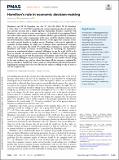Hamilton’s rule in economic decision-making
Author(s)
Levy, Moshe; Lo, Andrew W
DownloadPublished version (645.2Kb)
Publisher Policy
Publisher Policy
Article is made available in accordance with the publisher's policy and may be subject to US copyright law. Please refer to the publisher's site for terms of use.
Terms of use
Metadata
Show full item recordAbstract
<jats:title>Significance</jats:title>
<jats:p>Kin selection—helping genetically related individuals even at a cost to oneself—can be evolutionarily advantageous. This is the main theoretical explanation for altruism in the natural world. Hamilton’s rule provides a simple algebraic relationship that captures this profound idea. While behavior consistent with Hamilton’s rule has been observed in many species, a direct and sharp test of this rule has not yet been performed. In this paper, we employ techniques borrowed from experimental economics to test the predictions of Hamilton’s rule. We find strong support for the rule. This result sheds light on the dominant role played by evolutionary biology in explaining human behavior.</jats:p>
Date issued
2022-04-19Department
Sloan School of ManagementJournal
Proceedings of the National Academy of Sciences
Publisher
Proceedings of the National Academy of Sciences
Citation
Levy, Moshe and Lo, Andrew W. 2022. "Hamilton’s rule in economic decision-making." Proceedings of the National Academy of Sciences, 119 (16).
Version: Final published version